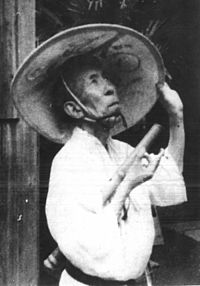Jun Tsuji Philosopher
Jun Tsuji, later Ryūkitsu Mizushima (辻 潤, Tsuji Jun, October 4, 1884 – November 24, 1944) was a Japanese author: a poet, essayist, playwright, and translator. He has also been described as a Dadaist, nihilist, Epicurean, shakuhachi musician, actor, feminist, and bohemian. He translated Max Stirner's The Ego and Its Own and Cesare Lombroso's The Man of Genius into Japanese.Tōkyō-born Tsuji Jun sought escape in literature from a childhood he described as "nothing but destitution, hardship, and a series of traumatizing difficulties". He became interested in Tolstoyan Humanism, Kōtoku Shūsui's socialist anarchism, and the literature of Oscar Wilde and Voltaire, among many others. Later, in 1920 Tsuji was introduced to Dada and became a self-proclaimed first Dadaist of Japan, a title also claimed by Tsuji's contemporary, Takahashi Shinkichi (高橋 新吉). Tsuji became a fervent proponent of Stirnerite egoist anarchism, which would become a point of contention between himself and Takahashi. He wrote one of the prologues for famed feminist poet Hayashi Fumiko's 1929 I Saw a Pale Horse (『蒼馬を見たり』 (Ao Uma wo Mitari)) and was active in the radical artistic circles of his time.
Search
Philosopher
| influenced | |
|---|---|
| influenced by | |
| notable idea | |
| philosophical school |
